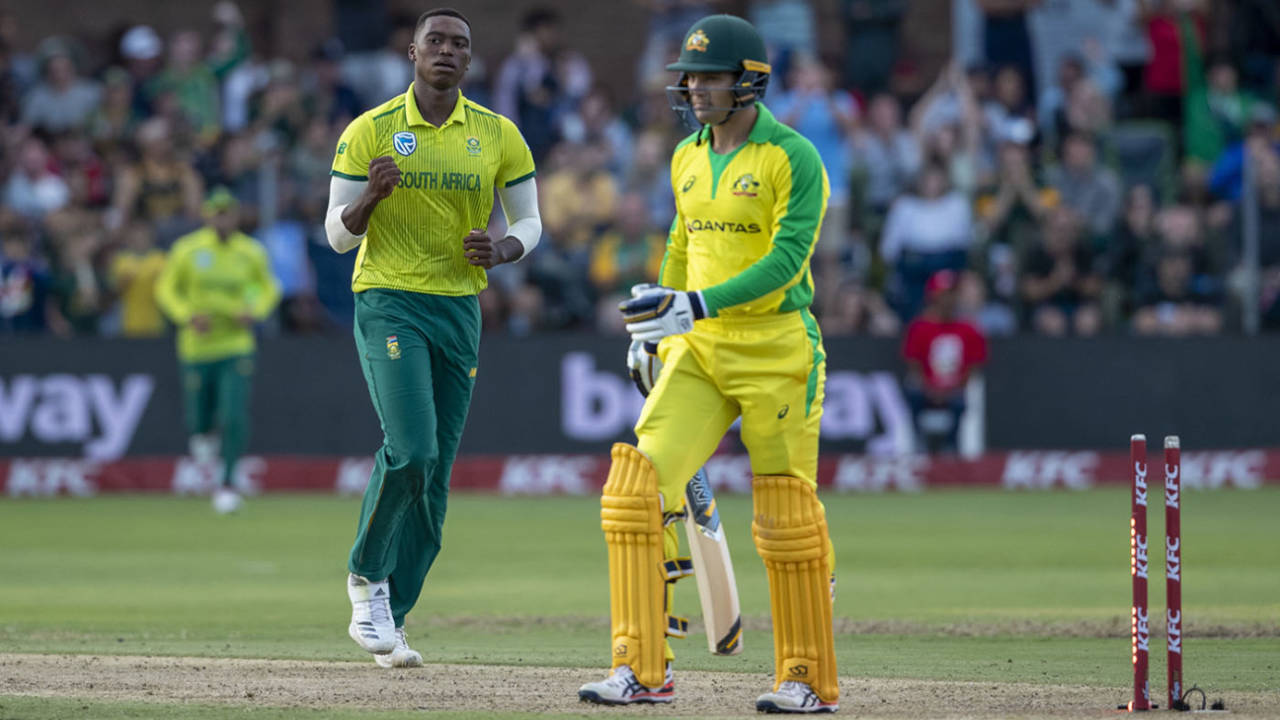South Africa bowlers squeeze out Australia despite David Warner knock
Lungi Ngidi, Kagiso Rabada and Anrich Nortje bowl nerveless overs to level series with fighting win
The Report by Firdose Moonda
23-Feb-2020
Lungi Ngidi celebrates the dismissal of Alex Carey • Associated Press
South Africa 158 for 4 (de Kock 70, Richardson 2-21) beat Australia 146 for 6 (Warner 67*, Ngidi 3-41) by 12 runs
South African cricket enjoyed its best day of the summer as both the men's and women's teams won in the final over of their respective T20s to secure results of great significance. The women beat England in the opening match of their T20 World Cup campaign, while the men stayed alive in the three-match rubber against Australia with a series-levelling victory in Port Elizabeth. South Africa defended a requirement of 25 runs off the last three overs on a subcontinental-like surface, where run-scoring slowed down in the second half of both teams' innings.
The victory will come as a major morale booster for a South Africa side that have not won a trophy this season but remain in the hunt to change that in the coming week. The decider will be played on Wednesday in Cape Town, the scene of the start of Quinton de Kock's takeover as permanent white-ball captain. De Kock has led from the front so far, both as captain and with the bat, and will be pleased that a team which included several changes from their defeat on Friday night (some injury-enforced) stepped up and an attack without the experience of Dale Steyn and only five bowling options got the job done.
Australia, though in the hunt for most of the match, need not be too disappointed with their efforts. As they fine-tune for a home T20 World Cup, being pushed a little is not bad thing and their big names - Pat Cummins, David Warner and Steven Smith - all made telling contributions.
Rabada bounces back
Kagiso Rabada was suspended from the final Test against England, rested for the white-ball series and came back rusty in Johannesburg, where he conceded 45 runs in three overs. But he came back strongly in this match. His first two overs were relatively expensive, 17 runs taken off him as he opened the bowling, but his final over put South Africa in a position to push for victory. Tasked with bowling the penultimate over, with Australia needing 20 runs to win, Rabada started with a slower ball and Matthew Wade popped a leading edge back to him for a simple return catch. His next five balls only cost three runs, including a wide, and he landed his yorker perfectly against Ashton Agar. Rabada left Anrich Nortje, brought into the side on his home ground, with 17 runs to play with in the last over, which ended up being more than enough.
Shamsi makes a statement
With Keshav Maharaj sitting atop the domestic one-day cup wicket charts, Tabraiz Shamsi's white-ball role could be coming under pressure but he ensured he answered questions about his suitability to contain with a miserly spell at St George's Park. His four overs cost just 17 runs and he gave away no boundaries, which pulled Australia back from 54 for 1 in the powerplay to needing 50 runs off the last six overs. Shamsi's consistency in this spell was the highlight as he bowled length outside off or a touch fuller for most of his 24 balls and did not concede any extras, after struggling with his line and bowling five wides in Johannesburg.
Saving sixes
Smith stopped two certain sixes as he showed off his hand-eye coordination and match awareness on the boundary. In the sixth over, after de Kock's early assault, Smith caught an attempt to clear midwicket on the rope, then threw the ball back in before he tumbled over and kept the batsmen to a single. Then in the final over, with newcomer Pite van Biljon trying to do his best to push South Africa over 160, Smith was fielding in the deep on the off side and the ball was smoked towards him. Again, he caught it, threw it back in as momentum took him over the rope and then recovered quickly enough to get back onto the playing area. If not for a small hurdle from the cushioning of the boundary rope, Smith would have taken the catch on the second go and van Biljon would have been out.
But it was the South Africans who saved a six with the most success, with some team-work to end Mitchell Marsh's innings. Marsh launched a Lungi Ngidi ball straight back down the ground, where Faf du Plessis got to the ball running from long-on, and took the catch before tossing it infield. David Miller was waiting and caught it low down to complete the dismissal.
Captain's knock
De Kock has scored six T20 fifties in his 42-match career, four of them as captain and two since taking over permanently from du Plessis earlier this month. He played some outrageous strokes in his 70, including a lap over fine leg off Cummins that went for six, another off Kane Richardson that bounced just in front of the boundary for four, and a down-on-one-knee straight six over Adam Zampa's head. De Kock's fifty came in 31 balls but he only added 20 more runs off the next 16 balls he faced, which was an early indication that run-scoring would become tricky.
Slow, slower, slowest
South Africa would have been fairly satisfied with the way their innings started, with 81 runs coming from the first 10 overs for only the loss of Reeza Hendricks, and may have been planning for a total of 180-plus. But the next five overs brought 41 runs and the last five only 36. Was the reason for South Africa's go-slow that the pitch became more difficult to bat on or was it that Australia's attack more became difficult to score off? Both and a combination of a few other things. Du Plessis was dismissed with the first ball of the second half of the innings when he holed out to the sweeper on the cover boundary off a Cummins' cutter. Cummins was brought back for the 18th over, and gave away only four runs while Richardson did not concede a boundary in three of the four overs he bowled, two in the second half of the innings, by taking pace off the ball. Towards the end of his innings, Rassie van der Dussen struggled to adjust to the lack of pace, as did Miller in his short stint and South Africa finished with what seemed a below-par score.
Australia's innings followed a similar pattern. They were 84 for 1 in the powerplay, scored 32 runs in the next overs and needed 41 in the last five (in which they scored only 30). The had the brakes applied by Dwaine Pretorius, who operated almost as a second spinner would, bowling offcutters and slower balls galore and Shamsi. Losing Alex Carey and Mitchell Marsh to Ngidi didn't help but they had Warner throughout the innings. However, in a similar fashion to de Kock, his 50 came off 38 balls and he was only able to add 17 more runs off the next 18 balls he faced.
Firdose Moonda is ESPNcricinfo's South Africa correspondent


